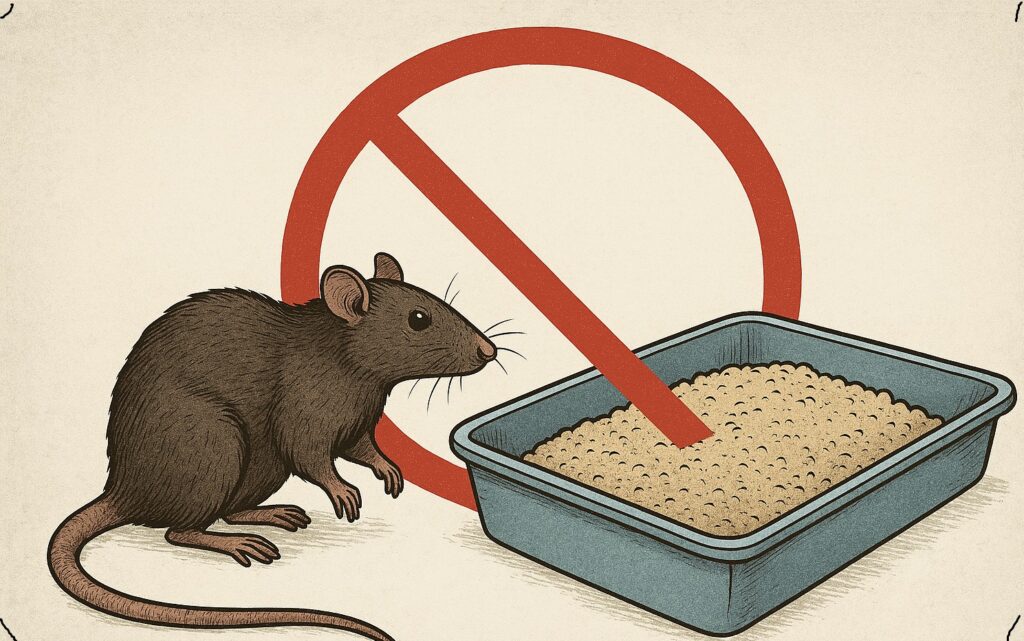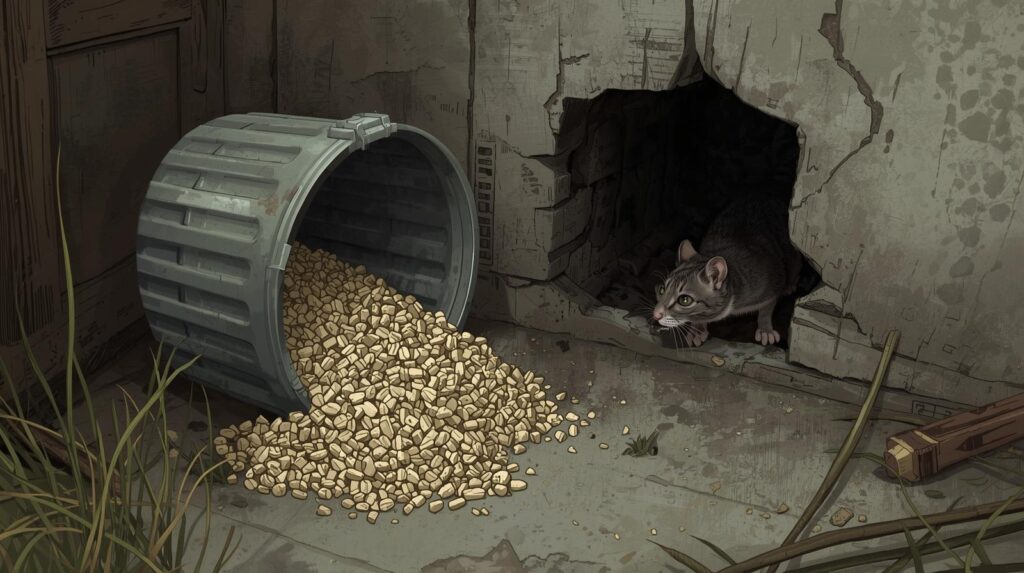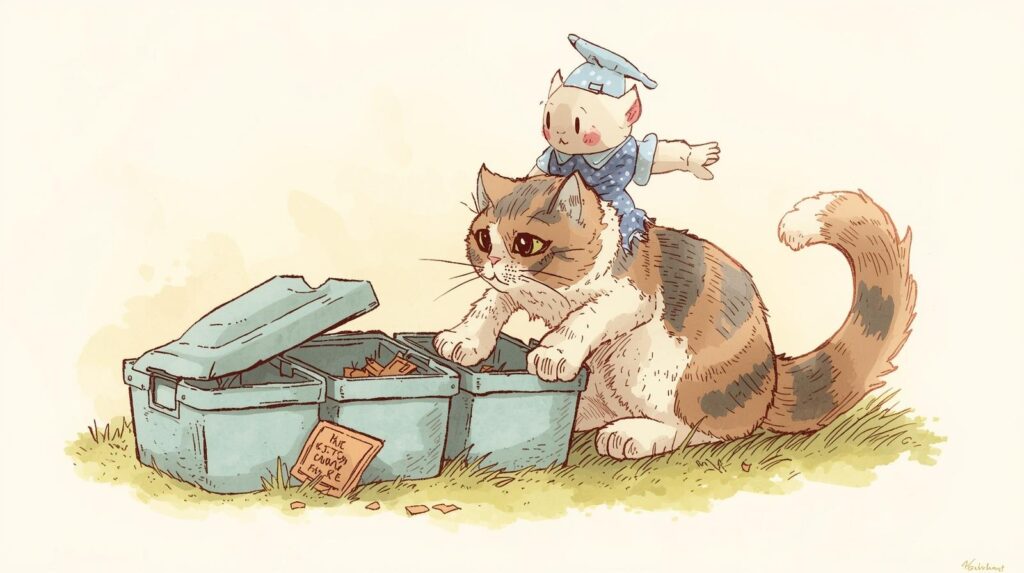
For centuries, humans have been locked in a never-ending battle with rats and mice. These persistent intruders not only damage food supplies and property but also pose serious health risks. Understandably, homeowners are always looking for safe and natural ways to keep rodents at bay. One surprising method that often comes up is the use of cat litter.
Does cat litter keep rats away? Yes — but only temporarily. The smell of used cat litter, especially cat urine, can make rats and mice cautious because it signals the presence of a predator. However, this effect fades quickly as the odor weakens, and rodents may adapt over time. More importantly, using dirty cat litter carries health risks (like parasites and bacteria), so it’s not considered a safe or reliable long-term solution. For lasting results, it’s better to use natural rodent deterrents (such as peppermint oil or vinegar), traps, and proper home maintenance.
If cat litter isn’t a foolproof solution, what else works? Many people turn to natural rodent control methods such as peppermint oil, cinnamon, vinegar, and citronella—all of which are known to repel rodents without introducing harmful chemicals into the home.
In this article, we’ll dive into whether cat litter really works as a rodent deterrent, what science has to say, the potential risks, and safer alternatives you can rely on.
Table of Contents
Why People Think Cat Litter Repels Rodents
The idea that cat litter can repel rodents comes from a simple truth: rats and mice have a natural fear of predators, especially cats. Over time, rodents have evolved to detect the scent of potential threats in their environment. When they pick up on the smell of cat pheromones or urine, they instinctively view the area as unsafe and avoid it. This is the basis of the predator scent theory used in many forms of natural pest control.
Cat Urine Smell as a Warning Signal
One of the strongest deterrents in this method is the cat urine smell left behind in used cat litter. To a rat or mouse, this odor signals that a predator is nearby, which could be enough to push them to seek shelter elsewhere. For this reason, some homeowners experiment with sprinkling small amounts of used cat litter as a deterrent around suspected entry points, basements, or garages.
Dirty Litter vs. Fresh Litter
It’s important to note that fresh cat litter has little to no effect on rodents, since it lacks the crucial predator odor that triggers their fear response. It’s the dirty cat litter—specifically the scent of cat urine—that holds any potential for rodent control. However, this raises health concerns, which we’ll explore later.
What the Research Says
Interestingly, science has taken a closer look at this phenomenon. A 2011 study reported by ScienceDaily showed that the parasite Toxoplasma gondii can actually alter a mouse’s fear response to cat urine. Infected rodents lost their natural aversion and, instead of avoiding the smell, they were drawn to it. This suggests that while predator odors may deter some rodents, the effect is not universal and can be influenced by biological factors.
In short, while the cat urine smell can keep rats away in some situations, it’s not always a guaranteed or long-term solution for predator odor rodent control.
What Science Says: Cat Litter vs. Rats & Mice
When it comes to answering the question, “Does dirty cat litter keep rats away?”, science provides both support and skepticism. Researchers have long studied how rodents respond to predator cues, and the evidence shows that the smell of cats can indeed influence rodent behavior—at least in the short term.
Rodents and Feline Scent Detection
Rats and mice have incredibly sharp senses of smell, which they use to detect predators. Studies show that rodents recognize the feline scent in urine or feces and often avoid areas that carry these odors. This is why some homeowners notice that simply having a cat in the house may reduce rodent activity. In this sense, a cat’s smell can keep mice away, acting as a natural deterrent.

Temporary Effect of Cat Litter
While there is some evidence that mice may avoid areas with used cat litter, the effect tends to be temporary. Over time, rodents may adapt or realize that no actual predator is present. Additionally, as the litter dries and the odor fades, its deterrent power weakens. This makes it unreliable as a long-term solution for feline scent pest control.
The Toxoplasma gondii Exception
One fascinating limitation comes from research on the parasite Toxoplasma gondii. A study highlighted in ScienceDaily (2011) found that infected mice actually lost their fear of cat urine altogether. Instead of avoiding the smell, they became strangely attracted to it. This means that while cat litter can act as a natural rat deterrent, its effectiveness may vary depending on biological factors outside of our control.
Practical Limitations
In real-world use, sprinkling dirty cat litter around the home or garden is impractical and poses health risks. Not only does the odor fade quickly, but handling soiled litter can expose humans and pets to parasites and bacteria. In other words, while the science supports the idea that cat smell may keep mice away, the method is far from perfect or safe as a stand-alone rodent control strategy.
Risks of Using Used Cat Litter for Pest Control
While the idea of using cat litter to keep rodents away may sound clever, there are several serious risks of using used litter for control that homeowners need to consider. What might seem like a cheap and natural rodent repellent can actually create new health and hygiene problems.
Health Hazards from Ammonia and Waste
Used cat litter contains ammonia from urine, as well as fecal matter that can harbor harmful bacteria. The strong odor may irritate the respiratory system, particularly in children, the elderly, or individuals with asthma. Leaving dirty litter in or around the home can quickly turn into a sanitation problem.
Parasites and Toxoplasmosis Concerns
One of the most well-documented dangers of cat waste is the parasite Toxoplasma gondii. This parasite not only affects rodents by altering their natural fear of cats, but the dust from litter can also infect humans. In healthy adults, it may cause flu-like symptoms; however, in pregnant women or individuals with immunocompromised conditions, it can lead to severe complications. This connection between toxoplasmosis and rodents highlights the double risk: not only might infected rodents ignore the deterrent, but humans could also be exposed to illness.
Risks for Pets and Wildlife
If dirty litter that contains mold is scattered outdoors, other animals—including neighborhood pets or wildlife—may come into contact with it. This exposure can spread parasites and diseases further into the environment.
Why Experts Advise Against It
Pest control professionals and veterinarians generally warn against using dirty litter as a repellent. While the cat’s smell may discourage rodents temporarily, it’s not a safe rodent management strategy at home. Instead, experts recommend safer, more reliable alternatives such as sealing entry points, maintaining cleanliness, and using natural repellents like peppermint oil or vinegar.
In short, the risks of using used cat litter for control often outweigh the potential benefits, making it a poor long-term solution for homeowners.
Alternative Natural Rodent Repellents
If the drawbacks of using cat litter make you hesitant, don’t worry—there are plenty of safer and more effective ways to deter rodents. Homeowners today have access to a variety of natural rodent control methods that don’t carry the health risks of dirty litter while still keeping mice and rats at bay.
Essential Oils as Natural Mouse Repellents
Strong-smelling essential oils are some of the most popular natural mouse repellents. Rodents rely heavily on their sense of smell, and certain scents overwhelm their sensitive noses, driving them away. Among the most effective are:
- Peppermint oil – a refreshing scent to humans, but overpowering to rodents.
- Cinnamon – both powder and oil forms can repel rats and mice.
- Citronella – often used for mosquitoes, but also effective against rodents.
- Vinegar – a common household product that creates an unwelcoming environment for pests.
Many homeowners wonder about peppermint oil vs cat litter for mice. While cat litter may provide a short-lived deterrent, peppermint oil is both safer and more practical, with no risk of parasites or contamination.
Predator Scent Products
Another form of scent-based pest control uses predator odors, but without the risks of handling cat waste. Commercial products made with fox urine, coyote urine, or bobcat scent are available in garden stores and can create the illusion of predators nearby, encouraging rodents to steer clear.
Home Maintenance and Prevention
Even the best repellents work best when combined with practical steps to reduce rodent access:
- Sealing entry points with steel wool or caulk.
- Storing food properly in sealed containers.
- Maintaining cleanliness by removing crumbs, spills, and clutter that attract pests.
Cats as Natural Deterrents
Of course, nothing beats the presence of an actual cat. Simply having a feline in the house can reduce rodent activity, as the natural predator-prey relationship discourages rats and mice from lingering. Unlike litter, this method provides a living, breathing form of deterrent.
In short, when it comes to natural rodent control methods, you have several safe, effective options that go far beyond cat litter.
Does Cat Litter Actually Work Long-Term? (Pros & Cons)
After looking at the science and risks, the big question remains: Is cat litter a reliable mouse and rat deterrent? The answer is complicated. While used cat litter rodent control might seem appealing, it has clear limitations when used on its own. Let’s break down the pros and cons.
Pros of Using Cat Litter as a Rodent Deterrent
- Cheap and easily available – Most cat owners already have litter at home.
- May deter rodents temporarily – The strong odor of urine can signal predator presence, making rats and mice cautious.
- Low-effort experiment – Sprinkling some in garages or near entry points doesn’t require special tools or training.
Cons of Cat Litter as a Mouse Deterrent
- Inconsistent results – Some rodents avoid it, while others ignore it or become accustomed.
- Health hazards – Parasites, bacteria, and ammonia fumes make used cat litter rodent control unsafe for long-term use.
- Not a permanent solution – Once the odor fades, so does the deterrent effect.
- Better options exist – Commercial repellents, traps, and sealing entry points offer more reliable results.
Cat Litter vs. Other Rodent Control Methods
Compared to commercial repellents, traps, or essential oils, cat litter as a mouse deterrent ranks low on effectiveness and safety. However, it can be part of a broader strategy. Many homeowners find success by combining natural deterrents—for example, sealing entry points, using peppermint oil, and keeping a cat—rather than relying on litter alone.
In summary, while cat litter may deter mice and rats temporarily, it is far from a long-term or risk-free solution. For best results, it should only be seen as a backup measure alongside safer, proven methods.
Final Verdict
So, does cat litter keep rats away? The answer is: yes, but only temporarily. The smell of used litter, especially traces of cat urine, may repel rodents for a short time by signaling the presence of a predator. However, this effect fades quickly, and the health risks of handling dirty litter outweigh any potential benefits.
If your goal is long-term, safe rodent control at home, cat litter is not the most reliable option. Instead, it’s better to focus on natural rodent deterrents such as peppermint oil, vinegar, or predator scent products, combined with practical measures like sealing entry points, proper food storage, and maintaining cleanliness.
In the end, while cat litter might provide a quick fix, it’s not a stand-alone solution. For lasting results, think of it as one piece of a broader, safer strategy to keep your home rodent-free.
FAQ
1. Does cat urine repel rats permanently?
No, cat urine does not repel rats permanently. While the smell may frighten rodents at first, they often adapt once they realize no actual predator is present. The odor also fades over time, making it ineffective as a long-term rodent control method.
2. Is fresh or dirty cat litter better for deterring rodents?
Only dirty cat litter has any deterrent effect, since the smell of urine signals the presence of a predator. Fresh, unused litter has no impact on rodents because it lacks the predator odor. However, using dirty litter carries health risks and is not recommended.
3. What are safe alternatives to using used cat litter?
Safer and more effective options include peppermint oil, vinegar, cinnamon, and citronella, as well as commercial repellents or predator scent products (like fox or coyote urine). These are cleaner, healthier, and longer-lasting than used litter.
4. Can I use cat litter outdoors to keep mice away?
Technically, yes—but it’s not advisable. Outdoors, the odor from used cat litter fades quickly, and rain or moisture makes it ineffective. Plus, it can spread parasites to other pets or wildlife. Instead, opt for natural mouse repellents or physical barriers.
5. Does having a cat keep rodents away better than litter?
Yes. An actual cat is far more effective than relying on its litter. The presence of a predator creates ongoing stress for rodents, making them less likely to infest the area.
7. Is cat litter effective against all pests?
No, cat litter only has potential effects on rodents like rats and mice. It does not deter insects, raccoons, skunks, or other pests. Different animals require different deterrents.
8. Can dirty cat litter spread diseases to humans?
Yes. Used litter may contain harmful bacteria and parasites such as Toxoplasma gondii. This is why pest control experts advise against using it for rodent prevention.
9. How can I make natural deterrents more effective?
The best approach is combining natural deterrents with prevention strategies: seal cracks, eliminate food sources, maintain cleanliness, and use repellents like peppermint oil alongside traps if necessary.


